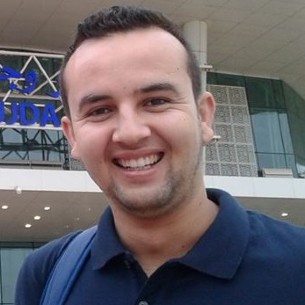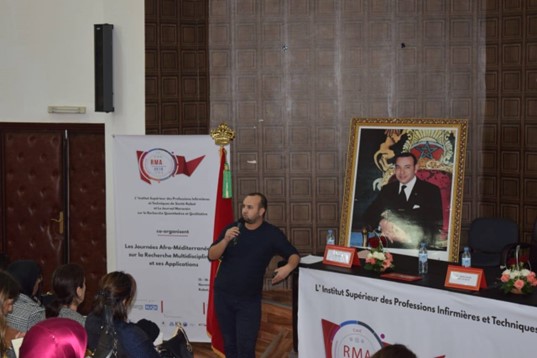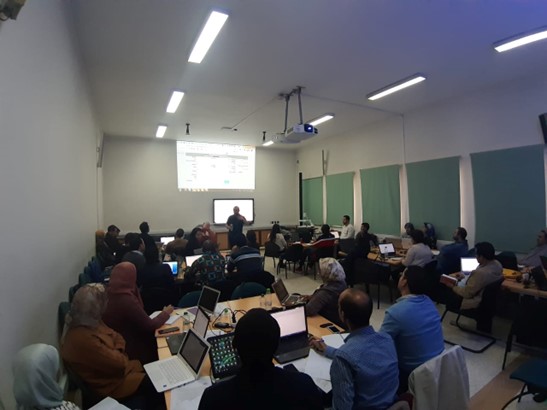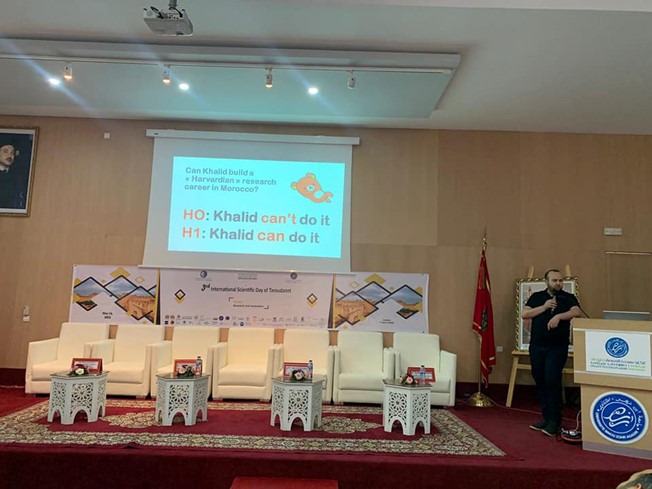 By Khalid El Bairi, MD
By Khalid El Bairi, MD
Read Part 1, Part 2, and Part 3.
Building Your Network of Impactful Friends Is Key
Young oncologists and cancer researchers in low- and middle-income countries (LMICs) do not receive sufficient training to conduct outstanding research. This is a documented factor that negatively affects poor research outputs in these settings,1,2 along with others such as poor mentorship and lack of international collaboration. In the beginning of my OVARNORDEST project, I was not well trained to accurately respond to scientific problems, appraise oncology publications, and resolve my problems myself. Fortunately, I had a significant number of helpful and inspiring friends around me who helped me toward my goal of having my ideas and papers published. Some of the inspiring people I worked with to further advance my project were Mariam Amrani, MD (pathologist at the National Institute of Oncology, Rabat), Maryam Fourtassi, MD, PhD (medical education, Faculty of Medicine and Pharmacy, Tangier), and other leading experts from all over the globe, such as Dario Trapani, MD (medical oncology, Italy) and Cécile Le Page, PhD (biomedical sciences, Canada). My relationships with these individuals began when we developed several successful publications projects; since then, I had the opportunity to have their continuous encouragements and input into my articles and I could rapidly progress after their support.
I also want to highlight the ONCOLLEGE initiative, which I joined to connect with brilliant oncologists from different countries to discuss difficult cases and build writing projects on emerging topics in oncology. This was wonderfully concluded by publishing several papers including original articles and reviews, as well as books. Importantly, the spirit of this adventure is that the young oncology workforce from LMICs can effectively engage with other inspiring oncologists from high-income countries (HICs) to share experiences and benefit from their skills and knowledge in the era of global oncology. This shows how social networking is important in LMICs to advance careers of young oncologists.
In addition, I have also joined various research networks, international scientific societies, and organizations and benefited from their support and supervision. The International Immuno-Oncology Working Group (TILs Working Group) is an example of a successful research working group that allowed me to explore other emerging fields such as prognostic and predictive biomarkers for immune-checkpoint blockade. This working group was developed by expert pathologists, oncologists, and statisticians to advance the field of immune-oncology. After joining the working group and 3 years of hard work, we were able to publish a paper on the tale of tumor-infiltrating lymphocytes in breast cancer,3 along with others on their integration into daily practice and clinical trials.4-7 Despite this field being novel for me, I had the opportunity to explore its perspectives in implementing surrogate biomarkers in LMICs based on the use of easily accessible and cost-effective biomarkers such as tumor-infiltrating lymphocytes and their promising inclusion as a secondary objective in my project. More importantly, this experience of supervision of cancer researchers in LMICs by outstanding researchers from HICs demonstrates the capability of international collaboration and networking in progressing careers of underrepresented young oncologists working in mentorship-constricted settings. If you are young researcher in an LMIC trying to launch your own career, I highly recommend building collaborations and networks with oncologists around the globe.
One of the important meetings that I had during my career was with an inspiring leader, former ASCO president Sandra M. Swain, MD, FACP, FASCO. She was very motivated to provide help and support to us in our under-resourced setting. She said, “I read your paper in The ASCO Post and I would like to help!” Even though she is based in the United States, very far from our team in Morocco, she demonstrated a beautiful energy to provide ideas on global oncology and discuss our issues and how to resolve them. Writing blogs or articles for magazines of international cancer societies, such as the ASCO, can help you share your ideas, connect with collaborators and progress in your field. Science has no borders—sharing ideas between researchers across countries can save lives.
In addition, joining scientific societies in your specialty has several advantages. Early-career researchers working on cancer may access preferential education and scientific content such as fellowships, master classes, courses, and conferences, in addition to networking with leaders in the specific field.
Don’t Forget to Share Your Oncology Knowledge and Research Skills
No matter your career stage, geographic location, or resource level, make sharing knowledge in oncology a ritual. The final target of any cancer research should be improving patients’ outcomes. To speed research on cancer in LMICs, standard research principles should be implemented including adequate training. During our OVANORDEST project, I was heavily involved in organizing dozens of workshops for residents, PhD students, and senior researchers in Morocco and even in other countries in our region, such as Tunisia. These events encompassed training on research methodology, ethics and integrity, medical writing, and evidence-based medicine.

Dr. El Bairi gives a presentation on best practices in academic publishing to an audience of young Moroccan researchers.

One of a series of training workshops delivered to young oncologists in Morocco and the surrounding region; this session covered how to critically read a meta-analysis of randomized and controlled clinical trials.

Dr. El Bairi gives a motivational talk on how to conduct high-quality research in under-resourced settings.
Today, I am glad to see that participants who attended those workshops several years ago are now publishing their papers in well-regarded journals instead of predatory journals, and gratified that my knowledge and support were able to help them on their own career journeys. Young researchers in under-resourced research environments can positively impact their settings by sharing their knowledge to improve country-based clinical research and achieve long-term sustainable development.
My research collaborators and I were also engaged in sharing our knowledge globally in a guide published in JCO Global Oncology with the support of the ASCO.8 This toolkit encompasses basic and practical principles and guidelines that young oncologists from resource-limited settings can use to achieve the goal of publishing excellence and advance their career, particularly given the lack of research training for curricular development in LMICs. This guide involves a number of rules to remember when doing research that may affect patient outcomes. Promisingly, trainees can effectively become trainers after achieving the required skills to attain research capacity strengthening. Thus, these individual interventions available to support research systems should be encouraged, as they can build enabling environments for research.
Moreover, young oncologists in LMICs should benefit from cancer research training programs offered by international cancer societies, such as those of the European Society of Medical Oncology, with a particular focus on career development including fellowships, mentorship programs, and preceptorships, in addition to advanced courses on cancer research methods. Programs like these can have a remarkable impact in delivering training to the workforce involved in oncology research and care in LMICs.
I will close with the inspiring words of Tenzin Gyatso, the 14th Dalai Lama, who was awarded the Nobel Peace Prize in 1989: “Share your knowledge. It is a way to achieve immortality.”
Dr. El Bairi is a research associate in the Department of Medical Oncology at Mohammed VI University Hospital, in Oujda, Morocco, and he is preparing for a career in medical oncology. He joined the ASCO Trainee & Early Career Advisory Group as a member for the 2022-2023 term. The contents of this paper reflect the author's perspective and not that of his institution of affiliation. Follow Dr. El Bairi on Twitter @elbairikhalid19. Disclosure.
References
- Alemayehu C, Mitchell G, Nikles J. Barriers for conducting clinical trials in developing countries- a systematic review. Int J Equity Health. 2018;17:37.
- Barrios CH, Mano MS. Is Independent Clinical Research Possible in Low- and Middle-Income Countries? A Roadmap to Address Persistent and New Barriers and Challenges. Am Soc Clin Oncol Educ Book. 2021;41:1-10.
- El Bairi K, Haynes HR, Blackley E, et al. The tale of TILs in breast cancer: A report from The International Immuno-Oncology Biomarker Working Group. NPJ Breast Cancer. 2021;7:150
- Hudeček J, Voorwerk L, van Seijen M, et al. Application of a risk-management framework for integration of stromal tumor-infiltrating lymphocytes in clinical trials. NPJ Breast Cancer. 2020;6:15.
- Kos Z, Roblin E, Kim RS, et al. Pitfalls in assessing stromal tumor infiltrating lymphocytes (sTILs) in breast cancer. NPJ Breast Cancer. 2020;6:17.
- Amgad M, Stovgaard ES, Balslev E, Tet al. Report on computational assessment of Tumor Infiltrating Lymphocytes from the International Immuno-Oncology Biomarker Working Group. NPJ Breast Cancer. 2020;6:16.
- Gonzalez-Ericsson PI, Stovgaard ES, Sua LF, et al. The path to a better biomarker: application of a risk management framework for the implementation of PD-L1 and TILs as immuno-oncology biomarkers in breast cancer clinical trials and daily practice. J Pathol. 2020;250:667-84.
- El Bairi K, Al Jarroudi O, Afqir S. Practical Tools and Guidelines for Young Oncologists From Resource-Limited Settings to Publish Excellence and Advance Their Career. JCO Glob Oncol. 2021;7:1668-81.


Recent posts